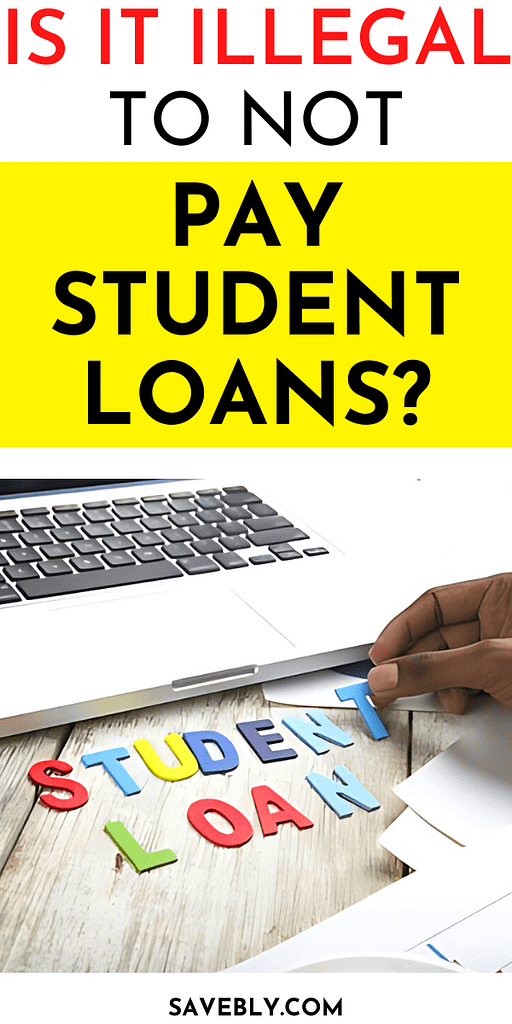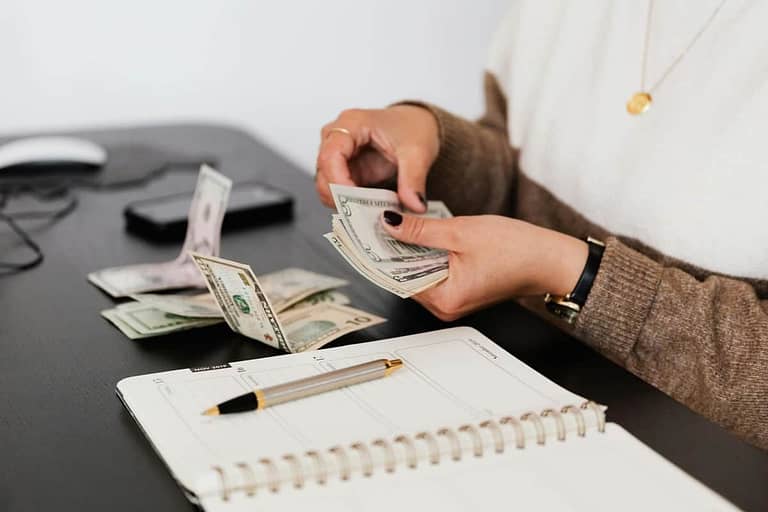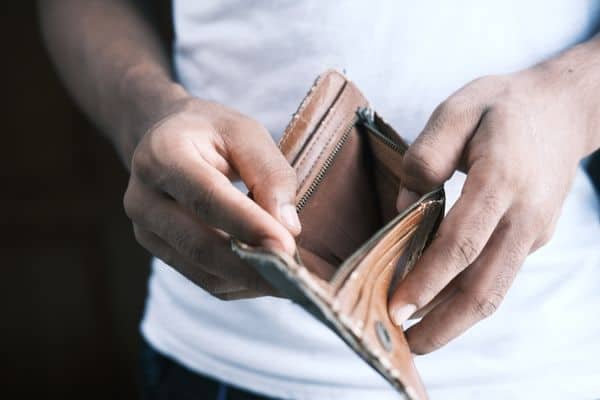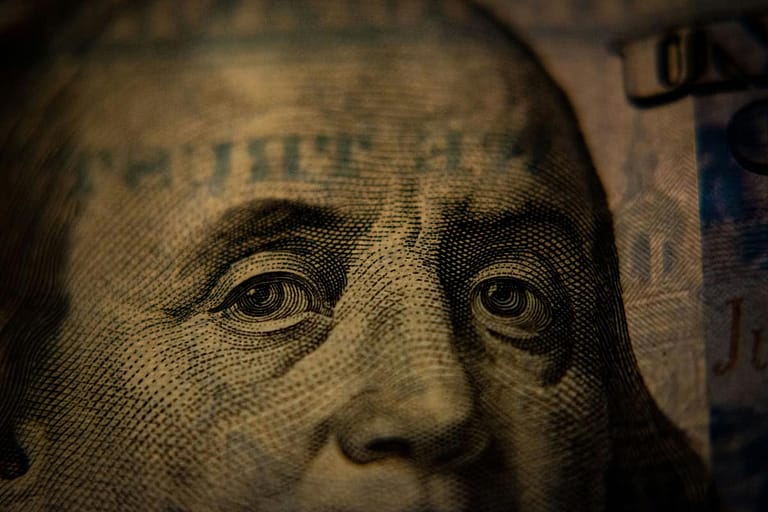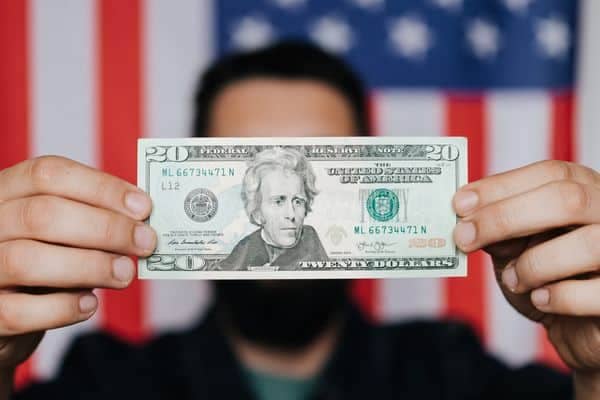Is it Illegal To Not Pay Student Loans?
Is it illegal to not pay student loans? You might be wondering this question as you struggle to pay off your student loans.
No… this is not an article on ways to avoid paying your student loans; it’s to educate you on what will happen if you don’t.
Student loans aren’t all bad; it’s an excellent way for those less fortunate to get a higher education to get into a high-paying career.
Governments often organize student loans in many countries, and they usually have very reasonable interest rates.
When you finish your studies, you must start paying back your student loans, or you will face the consequences.
Defaulting on repayment of the loan has effects like defaulting on paying credit card debts.
So, let’s see what will happen if one fails to repay student loans…
Student Loans 90 Days Overdue
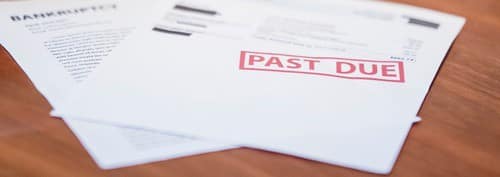
If you don’t make any payments to your student loans for up to 90 days, the only consequence you will face is late fees.
Late fees suck, but they won’t affect your finances long-term.
When you are 90 days overdue, the real negative impacts start to happen to your finances.
Lenders will report your name to the credit bureaus. We all know what it means to be reported to the credit bureaus; your credit score will definitely go down.
Many things can happen when your credit score is lowered, as we will outline below.
Therefore, people cannot afford to damage their credit history because of this simple mistake.
So, ensure you make a payment to your student loans before 90 days to avoid any negative impacts on your credit score.
Defaulting Stage For Student Loans

If the habit of not paying your student loans continues, you will reach the defaulting stage.
For most private loans, the default stage occurs after 120 days of no payments; for federal loans, the default stage occurs after 270 days.
The most common protocol to be followed by lending companies is to use a debt collection agency, which will do everything possible to ensure you repay.
After being listed with the credit bureaus and entering a defaulting stage, a couple of things could happen:
- Your credit score will be lowered.
- Your application for future credit cards may be denied.
- Obtaining loans and other financial help will become problematic.
- Legal action will be taken against you by the debt collection agency.
You definitely want to avoid reaching the defaulting stage, as it can drastically affect your finances.
Federal and private lenders can garnish your wages if you refuse to pay, and federal lenders can intercept your tax refund.
Can The Government and Banks Sue?

Every lender is experiencing a challenge because the rate of lending to current students is higher than the rate at which students who have graduated are repaying.
The amount owed to the government and banks keeps piling up by the year as more students find it challenging to repay.
As a result of this, the government has tried to develop different measures to ensure that all students repay their loans.
As mentioned above, the process is lenient since it takes several months before they can say that you have defaulted.
One of the measures the government has adopted is to collaborate with employers to deduct and remit student loan payments depending on the amount of income.
However, hundreds of thousands of students are not formally employed. Some are entrepreneurs, while others are jobless.
So, the big question is whether the government and banks can legally sue those who have defaulted or not.
Legally, the contract students sign before receiving student loans indicates the repayment terms and conditions.
So, the government and the banks can sue a person who has defaulted on repayment.
Several cases have been opened in a court of law, especially if the government and the banks can confirm that you are in a position to repay.
The court can issue a court order instructing you to repay the loans immediately.
This effort, together with lowering a person’s credit score, has enabled the government and the banks to recover a lot of money from people who have student loan debt.
Can You Go To Jail For Not Paying Student Loans?

Returning to the question, “Is it illegal to not pay student loans?”
It is not illegal to not pay student loans, which means you cannot go to jail for just not paying your student loans.
However…
As mentioned earlier, lenders can sue you for not paying your student loans, which will often lead to a court order, and if you don’t comply with the court order, you can be arrested.
So, while you cannot be directly arrested for not paying your student loans, you can face jail time if you don’t comply with the legal actions taken against you.
Ignoring court orders is never a good idea; you will open a whole new can of worms if you decide to do this!
Just comply with the court order and show up for your case, no matter how bad the situation is.
What To Do If You Can’t Pay Your Student Loans

If it comes to a point where you can’t pay your student loans, it is best to contact your lender immediately before things get worse.
While I won’t say lenders are angels, they will often work with you to come up with options so you can pay your loans and maintain a good financial record.
You can also look into options like repayment plans, consolidation, loan forgiveness, loan deferment, etc…
Many options are available, and you’ll have to find out which one applies to you, depending on your situation.
Another option you can take is to contact a financial advisor who will look into the factors that are leading to defaulting.
The experts will negotiate with your lenders to develop a better payment plan that is affordable to you.
In most cases, the lenders are flexible because their interest is to collect as much money as possible.
Together with your financial advisor, they will come to a consensus on the best terms to repay the loan that is reasonable and affordable to you.
From here on, you will now be required to repay without fail unless there are unavoidable circumstances.
On the other hand, you can start a better personal finance management plan to ensure that your student loans are included in your budget.
If needed, you can negotiate for lower repayment rates with the lenders.
You can take out another loan with more reasonable repayment terms to offset this one. There are a couple of options here, although personal loans are the best. You probably do not need collateral to secure one, especially for those with a stable source of income.
One may wonder why you need a personal loan with a higher interest than a student loan. But the main reason could be if other conditions like the monthly payments are more affordable than those of a student loan.
Therefore, it is essential that you weigh all the pros and cons of going in this direction.
Lastly, a person can liquidate an asset to clear the student loan if the individual struggles to repay.
If you or your family has a house, land, equipment, or even a car that can be sold to obtain money to pay off the loan, then this will relieve the burden of making monthly installment payments.
Many companies can assist you in selling a property or even buying it at the right price.
Some real estate companies do buy old homes and other properties no matter what condition they are in.
Also, selling any other asset online through various platforms is possible.
There are many options to take to pay your student loans before you end up in the default stage.
Before you get to this stage, make sure you play your cards right before your finances are affected negatively, which will have a long-term effect!
Conclusion
So, we answered the question on, “Is it illegal to not pay student loans?” and discussed what happens when you don’t pay your student loans.
Many people do not take the issue of student loan repayment seriously enough.
However, it is a serious matter that requires careful consideration. As mentioned above, the main adverse effect of not repaying student loans is damaging the credit score.
Yes, you can rebuild your credit score, but this takes a long time, and you won’t get another loan for many years due to the impact of defaulting on your student loans.
So, make a plan to pay your student loans on time and take it very seriously!
If you like this post, then I recommend checking out my posts on Building Credit History From Scratch: 5 Ways To Get Started and 17 Smart Money Tools To Use Right Now.
Do you have student loans? What is your plan to pay off your student loans? Let me know in the comments below!
